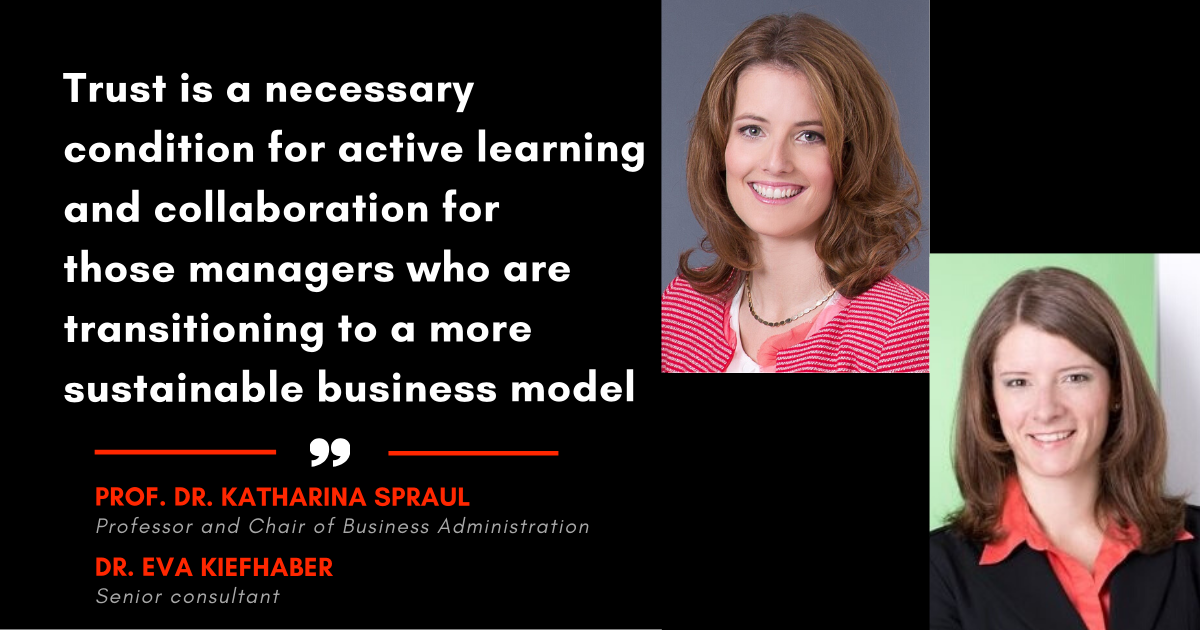How Sustainability Can Be Achieved in Small and Medium-Sized Enterprises?
How Sustainability Can Be Achieved in Small and Medium-Sized Enterprises:
Social Capital as the Often Ignored Critical Resource
Katharina Spraul & Eva Kiefhaber for the Octave webmagazine
Small and medium-sized companies should actively invest in their organizational sustainability by building and activating their social capital. Establishing trustful relationships with other businesses, experts and networks can help them mitigate possible disadvantages that may arise from their limited size and resources.
Too Big to Fail, too Small to Succeed?
Large multinational companies are often considered as the focal point of the current discussions about corporate social responsibility (CSR), human rights issues in global value chains and climate action. They are constantly monitored by nonprofit organizations, subject to consumer boycotts and legally obliged to report about their non-financial performance.
Yet, more than 90 percent of companies worldwide are small and medium-sized enterprises (SMEs). In countries such as the United States and Austria, Germany or Switzerland, SMEs contribute about one third of the gross domestic product and employ more than 60 % of employment subject to social security contributions. In contrast to their many positive economic and social contributions, it is estimated that they are also responsible for 60 to 70 % of the environmental pollution caused by industry in general. Given these economic, social and environmental impacts, SMEs are considered to have a significant potential to improve the sustainability performance of our society.
The problem is: only a fraction of SMEs have been strategically involved in sustainability so far. While SMEs often engage in a long-term business perspective and care a lot about their employees and the community they are operating in, many of them fear the administrative burden, consider their companies as not significant enough and lack the resources such as time, specialized staff, and expertise regarding CSR and sustainability to go the extra mile. In terms of external influence, SMEs may lack both the pressure and the positive encouragement such as monetary incentives. As a result, they may fail to notice potential sustainability-oriented innovations and how to leverage them.
Social Capital – the Resource Every SME Should Actively Build and Use
Despite the challenges, SMEs should consider one critical resource in their journey towards more sustainability: their social capital. Every company, big or small, is rooted within various networks of relationships, with suppliers, customers, employees, advisors, etc. But it is often the SMEs who have established close relationships with their environment and want to act socially responsibly for their surrounding community. The benefits that they derive from such networks and their environment is their social capital – and they should use it!
From a study with German SME managing directors and executives, we learned that their social capital is an important driver for the sustainability activities of their companies. SMEs’ social capital can help them overcome barriers in their engagement like a lack of time and resources to implement the topic on their own. This mechanism requires the right sustainability content in newsletters, training opportunities, or coaching and consulting services provided by chambers, professional associations, or larger manufacturers. If this content is missing, SMEs should actively address sustainability topics in existing networks.
There is, however, a crucial element that they should consider: Trust is a necessary condition for active learning and collaboration for those managers who are transitioning to a more sustainable business model. Especially for SMEs with a local market focus, trust and collaboration develop more easily in a non-competitive setting. So, network administrators should either mix and match local companies from different industries, or expand the network to a broader geographic range to avoid local cannibalization. In any case, owner-managers with a high level of social capital can serve as multipliers who draw more members into the network.
What Makes Sustainability Networks Successful
Today, there is a broad range of networks that companies can access for support in everyday business life. With time as a restricting factor, we encourage SMEs to actively approach their existing networks to provide sustainability-related content. This way, they can use existing structures to help transform their own company and others towards more sustainability. If those networks are not competent enough, managers should look for existing regional or transregional networks that specifically relate to sustainability. In our sample, very few SMEs that achieved a high level of sustainability activities had developed their ideas without any external help.
As our study of different sustainability networks in the DACH region shows, content-related factors (e.g., the professional credibility of the network organizers, common sustainability interests of the members or clearly formulated sustainability goals) are particularly relevant for network success. In determining which network provides the most benefit for a participant, their mechanism of resource access is another important distinction: Industry and networks that focus on particular topics provide resources specific to the SMEs’ current challenges, e.g., best practices for low-carbon production. Regionally focused networks provide better social capital and related knowledge within the region, such as information on specific public funding.
 Prof. Dr. Katharina Spraul is full professor and Chair of Business Administration, in particular Sustainability Management, at Technische Universität Kaiserslautern, Germany. She graduated with a Master’s degree in business administration from University of Mannheim, where she completed both her Ph.D. and post-doctoral degree (Habilitation). She has been visiting academic at Durham University Business School, UK, and visiting researcher at University of Padova, Italy. Her research deals with sustainability management in and between the three sectors market, state and civil society, and has been published in scientific outlets such as Business & Society and Journal of Business Ethics.
Prof. Dr. Katharina Spraul is full professor and Chair of Business Administration, in particular Sustainability Management, at Technische Universität Kaiserslautern, Germany. She graduated with a Master’s degree in business administration from University of Mannheim, where she completed both her Ph.D. and post-doctoral degree (Habilitation). She has been visiting academic at Durham University Business School, UK, and visiting researcher at University of Padova, Italy. Her research deals with sustainability management in and between the three sectors market, state and civil society, and has been published in scientific outlets such as Business & Society and Journal of Business Ethics.
 Dr. Eva Kiefhaber is a senior consultant at :response, a company for CSR and sustainability advice based in Frankfurt, Germany. She studied business administration in Cologne and Madrid. After having worked at the sustainability department of SAP for two years, she pursued a doctorate at the Department of Business Studies and Economics at Technische Universität Kaiserslautern, Germany. Her dissertation, which was supervised by Katharina Spraul, deals with Sustainability in Small and Medium-Sized Enterprises and provides an empirical investigation of drivers on individual, organizational, and network level. It has been published by Nomos Publishing.
Dr. Eva Kiefhaber is a senior consultant at :response, a company for CSR and sustainability advice based in Frankfurt, Germany. She studied business administration in Cologne and Madrid. After having worked at the sustainability department of SAP for two years, she pursued a doctorate at the Department of Business Studies and Economics at Technische Universität Kaiserslautern, Germany. Her dissertation, which was supervised by Katharina Spraul, deals with Sustainability in Small and Medium-Sized Enterprises and provides an empirical investigation of drivers on individual, organizational, and network level. It has been published by Nomos Publishing.
Share this Post








